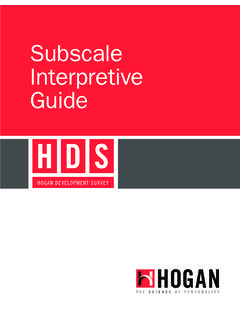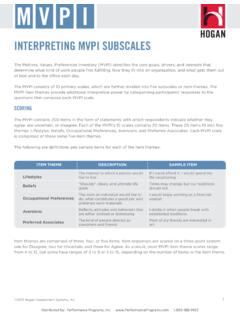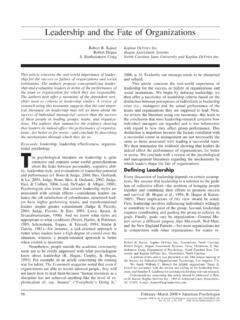Transcription of Schein Career Anchor Report - careeranchorsonline.com
1 Career Anchors 2006 by John Wiley Sons, Inc. Published by Pfeiffer, An Imprint of Wiley. All rights for:John SmithDate: September 27, 2006 IntroductionThe purpose of the Career Anchors self-assessment is to help you to manage your Career choices. A self-analysis of your Career up to this point is essential if you are to make good choices as you look ahead. Why is this important? In many occupations and organizations, careers are either over-managed or not managed at all. You either have to conform to choices that others are making for you or you get the message that you had better manage your own Career or you may not get anywhere.
2 There is overwhelming evidence that, in an increasing complex and global world, individuals have to become more self-reliant. But you cannot be more self-reliant if you do not have a clear concept of what you are good at, what you value, and what motivates you. This self-image of competence, motives, and values is your Career Anchor . This Report is designed to help you identify your Career Anchor and to think about how it relates to your Career Anchor is:LS : Life StyleYour Scores LS : Life Style32CH : Pure Challenge22GM : General Managerial Competence19SE : Security/Stability13TF : Technical/Functional Competence10AU : Autonomy/Independence10EC : Entrepeneurial Creativity10SV : Service/Dedication to a Cause9 Profile for:John SmithCareer Anchors 2006 by John Wiley Sons, Inc.
3 Published by Pfeiffer, An Imprint of Wiley. All rights Your Career AnchorBelow is a description of your Career Anchor that combination of perceived areas of competence, motives, and values that you discover you would not give up if you faced a Career decision that might not allow you to fulfill it. It represents your real LifestyleIf you scored highest in this column, your Career Anchor is lifestyle. What you would not give up is a situation that permits you to balance and integrate your personal needs, your family needs, and the requirements of your Career .
4 You want to make all of the major sectors of your life work together toward an integrated whole, and you therefore need to develop a Career situation that provides enough flexibility to achieve such integration. You may have to sacrifice some aspects of the Career for example, a geographical move that would be a promotion but would require your spouse to give up his or her Career aspirations or would require your children to leave a good school. You define success in terms broader than just Career success. You feel that your identity is more tied up with how you live your total life, where you settle, how you deal with your family situation, and how you develop yourself than with any particular job or organization.
5 People with this Anchor sometimes organize their own careers around the careers of spouses, in terms of the geographic area in which they want to live, or in terms of issues such as where they want their children to grow up or go to school. Geographic issues often play a key role in that people with this Anchor seek areas where both Career and family needs can be optimally met. The person in this dilemma may have another Anchor in one of the above categories but chooses to subordinate the expression of that Anchor to the more general lifestyle ExamplesLudwig Schmidt was a high-potential middle manager working for a large oil company in its New York headquarters.
6 He was on a general management track in the organization, although he was a German with a German wife. When his son was eight years old, Ludwig was offered a major promotion in the company that would require remaining in New York for the next five years. Ludwig turned down the promotion and opted instead for a lesser job in the German subsidiary because he and his wife decided that they wanted to bring up their son in the German culture and considered the next five years to be crucial in forming his identity.
7 Lisa Sargent, in mid- Career on a general manager track, had to choose between a very large promotion in the headquarters of a company located in a rural area and a much less prestigious job in a corporation in a large urban area. Her husband was in a technical field, and his chances of finding a job in the urban area were much better, so Lisa chose the less prestigious job in order to maximize both of their chances to have satisfactory for:John SmithCareer Anchors 2006 by John Wiley Sons, Inc. Published by Pfeiffer, An Imprint of Wiley.
8 All rights of Career Anchor CategoriesFOLLOWING IS A DESCRIPTIONof the eight Anchor categories that have consistently shown up in all kinds of occupations. After each description, you will find two short examples that help illustrate how the Anchor functions and its impact on Career decision first two anchors to be described technical functional competence and general managerial competence revolve around a dominant sense of what one is competent TF Technical/Functional CompetenceIf you scored highest in this column, your Career Anchor is competence in some technical or functional area.
9 What you would not give up is the opportunity to apply your skills in that area and to continue to develop those skills to an ever-higher level. You derive your sense of identity from the exercise of your skills and are most happy when your work permits you to be challenged in those areas. You may be willing to manage others in your technical or functional area, but you are not interested in management for its own sake and would avoid general management because you would have to leave your own area of expertise.
10 The biggest problem for people with this Anchor is that they tend to be pulled into generalist managerial jobs in which they may fail and that they will GM General Managerial CompetenceIf you scored highest in this column, your Career Anchor is general managerial competence. What you would not give up is the opportunity to climb to a level high enough in an organization to enable you to integrate the efforts of others across functions and to be responsible for the output of a particular unit of the organization.






